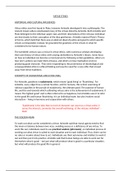VIRTUE ETHICS
HISTORICAL AND CULTURAL INFLUENCES
Virtue ethics was first found in Plato, however Aristotle developed it into a philosophy. The
Ancient Greek culture emphasised many of the virtues listed by Aristotle. Both Aristotle and
Plato belonged to the Athenian upper class and their descriptions of the virtuous individual
are tied closely to their conception of the idea gentlemen. Aristotle rejected Plato’s Theory
of Forms, which held that there was an abstract ideal of justice and good to which specific
virtues corresponded. Instead, he grounded the goodness of the virtues in what he
considered to be human nature.
The twentieth century saw a revival in virtue ethics, with numerous scholars developing
their own theory of virtue ethics with varying similarities to Aristotle’s theory. Some focus
on how an individual can become a moral person by following certain guidelines, others on
how one’s actions can make them virtuous, and others on how motivation is key to
producing good character. They were responding to the prominence of deontological and
consequentialist ethics in ethical thinking and saw the need for a new ethic that moved
away from these traditions.
CONCEPTS OF EUDAIMONIA AND LIVING WELL
For Aristotle, goodness is eudaimonia, which means ‘good living’ or ‘flourishing’. For
Aristotle, every object has a certain function, and for humans, this is their exercising of
rational capacities in the pursuit of eudaimonia, the ultimate good. The purpose of human
life, and the end towards which cultivating virtues aims is the achievement of eudaimonia. It
means ‘the highest good’ and is often referred to as happiness, but Aristotle uses it to refer
to the good life and human flourishing. It is an individual state, but also involves social
interaction – living in harmony and cooperation with others.
‘Eudaimonia is the idea that no trait of character can count as a virtue unless it
serves the interests, promotes the overall well-being, of the virtuous individual’ –
Slote
THE GOLDEN MEAN
To work out what can be considered a virtue, Aristotle said that moral agents need to find
the mean or balance between two vices, avoiding excess or a deficiency of any virtue. To
work this out, individuals need to use practical wisdom (phronesis), an individual process of
working out what virtue is suited to each situation and to each individual. Thus, there can be
no rules or maxims about how to act. Individuals use their autonomy and intellect to work it
out and then put it into practice. Aristotle said that human beings are able to work out for
themselves what is good – not just what will produce what is good in a particular situation,
but what will produce the good life in general.




